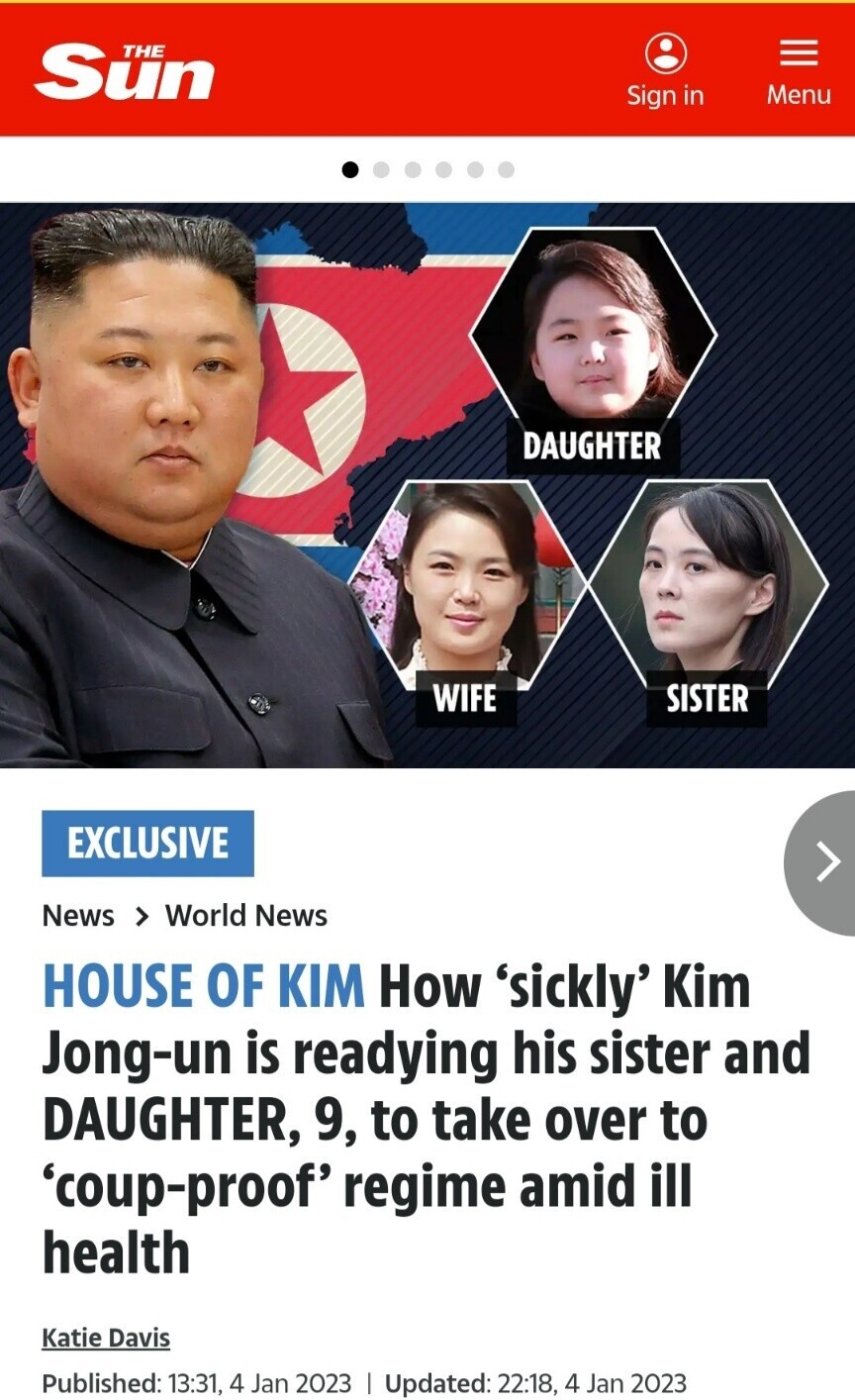hankyoreh
Links to other country sites 다른 나라 사이트 링크
[Column] Why UK media is obsessed with North Korea


By Seo Soo-min, professor of communications at Sogang University
If you were to approach a random old lady on the streets of England to ask them if they knew who the “princess” of North Korea is, you might be surprised by how fast they reply: “Ju-ae!” This is because British media outlets publish nearly nonstop articles on North Korea. Tabloid newspapers such as The Sun or The Daily Mail publish far more articles on North Korea than South Korean newspapers. If you search for “Kim Jong-un” in The Sun, you’ll pull up more than 2,400 search results.
Why are there so many reports on North Korea in the UK, where North Korea is not as pressing of a news issue as countries such as the US or Japan? Curious to find out, I conducted a full analysis of how six important British news outlets, three tabloid newspapers and three traditional newspapers, reported on North Korea.
What was immediately noticeable was the softening of news and explosion of coverage led by tabloids. Although coverage of North Korea was minimal in the early 2000s, which was when North Korea actively engaged in diplomatic relations with Western countries and held various cultural exchange events, it skyrocketed after the death of former North Korean leader Kim Jong-il.
Most noticeably, the focus of the newspapers lay on a wide variety of issues, such as sports, movies, and the detention of foreigners, instead of more traditional stories focusing on diplomacy and national security.
Most of the articles are negative and racist. Words like “grotesque,” “bizarre,” “crazy,” and “odd” were used frequently to emphasize North Korea’s abnormality. Even considering how tabloid journalism is known for its tendency to exaggerate and satire, mockery of North Korean leaders’ physical appearances went a little too far.
Traditional media were no exception. The liberal British daily newspaper, The Guardian, reported in the first paragraph of an article titled “Who is the shortest world leader?” that former North Korean leader Kim Jong-il stood at only 162 cm, or around 5 feet and 3 inches.
The article itself seems nothing more than clickbait perpetuating age-old stereotypes about “small, fat, and unattractive” Asian men. Underlying such a mindset is the neoliberal rationalization in which the outlet decides to fish for more views since North Korea is isolated from the international community and will not be able to ask for the article to be corrected.
However, the nature of reports changed over time. Articles on a variety of themes such as sports, economy, and gender issues stood out by demonstrating a deep understanding and fondness of North Korean society.
This can be demonstrated by how a 2009 article covering the World Cup sympathetically said one can’t help but cheer for the North Korean football team, who, even if their feet are bleeding, give it their all as they dash across the pitch, and a 2015 article which said that Kim Jong-un may be raising international tensions by threatening purges and aggravating tensions around nuclear war, but on the domestic front he is stepping up for the North Korean lower and middle classes by building housing and other facilities for their convenience.
The UK’s obsession with North Korea can also be attributed to the fact that, since the public is accustomed to news coverage on royalty, North Korea can be seen as a country that continues to see its own “succession of royalty.”
The spectacle of the Arirang Mass Games and the Cold War nostalgia the socialist state brings up are also factors that seem to make the UK public unable to tear its eyes away from North Korea.
Regardless of the reasons, there has been a quality shift that has expanded both the breadth and depth of North Korea coverage, and as a result, North Korea coverage has succeeded in entering the “mainstream” of British international reporting.
How does South Korean media cover North Korea issues? Apart from South Korea’s three main news outlets, including Yonhap News, not many outlets cover North Korea. Even the few North Korean specialists with experience covering North Korea issues directly and can read between the lines of North Korean sources are retiring without anyone to continue their work. Why? Because readers and viewers are simply not interested in news about North Korea.
One reporter specializing in North Korea put forth their analysis of the situation by saying, “Hostility toward North Korea has undermined the objectivity of the media, which in turn has led to a vicious cycle of disdain and disregard for North Korea.”
Once upon a time 20 years ago, reporters could take a bus to Kaesong or hop on a flight to Pyongyang. What was more important than the articles written in those cities were the relationships fostered along the way. Memories of wondering whether we would be able to meet again after the end of every official meeting are now nothing more than memories. The reality we face today is one where South Korean news outlets pay even less attention to North Korea than those of the UK.
Please direct questions or comments to [english@hani.co.kr]

Editorial・opinion
![[Editorial] Seoul failed to use diplomacy with Moscow — now it’s resorting to threats [Editorial] Seoul failed to use diplomacy with Moscow — now it’s resorting to threats](https://flexible.img.hani.co.kr/flexible/normal/500/300/imgdb/original/2024/0624/8217192182656295.jpg) [Editorial] Seoul failed to use diplomacy with Moscow — now it’s resorting to threats
[Editorial] Seoul failed to use diplomacy with Moscow — now it’s resorting to threats![[Column] Balloons, drones, wiretapping… Yongsan’s got it all! [Column] Balloons, drones, wiretapping… Yongsan’s got it all!](https://flexible.img.hani.co.kr/flexible/normal/500/300/imgdb/original/2024/0623/9117191084517636.jpg) [Column] Balloons, drones, wiretapping… Yongsan’s got it all!
[Column] Balloons, drones, wiretapping… Yongsan’s got it all!- [Editorial] It’s time for us all to rethink our approach to North Korea
- [Column] Why empty gestures matter more than ever
- [Editorial] Seoul’s part in N. Korea, Russia upgrading ties to a ‘strategic partnership’
- [Column] The tragedy of Korea’s perpetually self-sabotaging diplomacy with Japan
- [Column] Moon Jae-in’s defense doublethink
- [Column] S. Korea-China cooperation still has a long way to go
- [Editorial] Seoul must use tact and diplomacy to check deepening Russia-NK ties
- [Editorial] Thorough audit, evaluation of oil test drilling are needed
Most viewed articles
- 1[Editorial] Seoul failed to use diplomacy with Moscow — now it’s resorting to threats
- 2After Putin’s Pyongyang summit, Seoul and Moscow play dangerous game
- 3Han says he’ll seek special counsel bill on Marine’s death if elected PPP chief
- 4Enough trash-slinging — it’s time to pursue ‘strategic communication’
- 5Is Korea ready to protect the rights of Filipino domestic workers arriving this fall?
- 6US nuclear-powered carrier arrives in Busan for drills with South Korea, Japan
- 7Russia might provide military tech assistance to N. Korea if S. Korea crosses red lines, says expert
- 8[Column] Balloons, drones, wiretapping… Yongsan’s got it all!
- 9North Korea, Russia deal blow to US-led order – how will Washington respond?
- 10Russia’s actions will dictate what weapons Seoul may supply to Ukraine, security adviser says